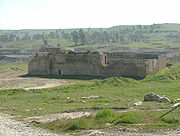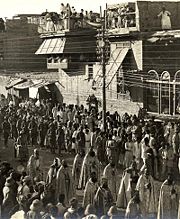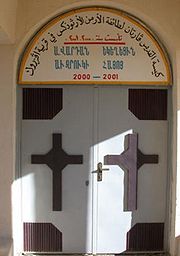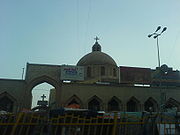
Christianity in Iraq
Encyclopedia
The Christians of Iraq
form one of the oldest Christian communities of the Middle East. The vast majority are Aramaic speaking ethnic Assyrians
with much smaller numbers of Armenians
, Arabs, Turcoman
and Kurds.
In Iraq, Christians numbered about 636,000 to 800,000 in 2005, representing just over 3% of the population of the country. They numbered over 1 million in 1980 or 7% of the population.
 The majority of the Iraqi Christians belong to the Eastern Rite
The majority of the Iraqi Christians belong to the Eastern Rite
churches.
 Christianty was brought to Iraq in the first century by the Apostle Thomas, Addai (Thaddaeus) and his pupils Aggagi and Mari. Thomas and Thaddeus belonged to the twelve Apostles. Iraq's Assyrian Christian communities are among the oldest in the world. The indigenous Assyrians
Christianty was brought to Iraq in the first century by the Apostle Thomas, Addai (Thaddaeus) and his pupils Aggagi and Mari. Thomas and Thaddeus belonged to the twelve Apostles. Iraq's Assyrian Christian communities are among the oldest in the world. The indigenous Assyrians
adopted Christianity in the first century AD. and Assyria became the centre of Eastern Rite
Christianity from the 1st century AD until the middle ages. In the early centuries after the Islamic conquest, Christian scholars and doctors played an influential role in Iraq, however, from the late 13th century until the early 16th century, Christians suffered persecution and some massacres. In 1932, the Iraqi military carried out large-scale massacres against the Assyrians (Simele massacre
).
Some of the Armenian Christians are descendants of refugees fleeing massacres in the early 1900s in Turkey
.
Prior to the Gulf War in 1991, Christians numbered one million in Iraq. The Baathist rule under Saddam Hussein
kept a lid on anti-Christian violence but subjected some to "relocation programmes". Under this regime, the predominantly Assyrian Christians were pressured to identify as Arabs. The Christian population fell to an estimated 800,000 before the 2003 invasion of Iraq
.

 After the 2003 invasion of Iraq, violence against Christians rose, with reports of abduction, torture, bombings, and killings. Some Christians were pressured to convert to Islam under threat of death or expulsion, and women were ordered to wear Islamic dress.
After the 2003 invasion of Iraq, violence against Christians rose, with reports of abduction, torture, bombings, and killings. Some Christians were pressured to convert to Islam under threat of death or expulsion, and women were ordered to wear Islamic dress.
In August 2004, International Christian Concern
protested an attack by Islamists on Iraqi Christian churches that killed 11 people. See 2004 Iraq churches attacks
. In 2006, an Orthodox Christian priest, Boulos Iskander, was beheaded and mutilated despite payment of a ransom, and in 2008, Archbishop
Paulos Faraj Rahho of Mosul
died after being abducted. In January 2008, bombs exploded outside nine churches.
Christians live primarily in Baghdad
, Basra
, Kirkuk
, Arbil
and Mosul
and in Assyrian towns in the north.
In 2010, reports emerged in Mosul of people being stopped in the streets, asked for their identity cards, and shot if they had a name indicating Assyrian or Christian origin. On 31 October 2010, 58 people, including 41 hostages and priests, were killed after an attack on a Catholic church in Baghdad. See October 2010 Baghdad church attack. A group affiliated to Al-Qaeda, Islamic State for Iraq, stated that Christians were a "legitimate target." In November, a series of bombings and mortar attacks targeted Christian-majority areas of Baghdad.
Half the Christian population has fled, with an estimated 330,000 to Syria
and smaller numbers to Jordan
. Some fled to Iraqi Kurdistan
in northern Iraq. Christians who are too poor or unwilling to leave their homeland have fled mainly to Arbil
, particularly its Christian suburb of Ainkawa. 10,000 Iraqi Christians live in the U.K. led by Archbishop Athanasios Dawood who has called on the government to accept more refugees.
Apart from emigration, the Iraqi Christians are also declining due to lower rates of birth and higher death rates than their Muslim compatriots. Also since the invasion of Iraq, Christians have been targeted by extreme Islamic organisations.
's death sentence was not signed by the Iraqi president in 2010 because the president "sympathise[d] with Tariq Aziz because he is an Iraqi Christian."Talabani against Aziz execution, Al Jazeera English This also came after appeals from the Holy See not to carry out the sentence.Iraq president refuses to sign death order for ex-official, The Washington Post
Iraq
Iraq ; officially the Republic of Iraq is a country in Western Asia spanning most of the northwestern end of the Zagros mountain range, the eastern part of the Syrian Desert and the northern part of the Arabian Desert....
form one of the oldest Christian communities of the Middle East. The vast majority are Aramaic speaking ethnic Assyrians
Assyrian people
The Assyrian people are a distinct ethnic group whose origins lie in ancient Mesopotamia...
with much smaller numbers of Armenians
Armenians
Armenian people or Armenians are a nation and ethnic group native to the Armenian Highland.The largest concentration is in Armenia having a nearly-homogeneous population with 97.9% or 3,145,354 being ethnic Armenian....
, Arabs, Turcoman
Iraqi Turkmen
The Iraqi Turkmen are an ethnic group who mainly reside in northern Iraq. Estimates of their numbers vary dramatically, in accordance with Iraq's assimilation policies no realistic and independent census results have been revealed regarding the Iraqi Turkmen population...
and Kurds.
In Iraq, Christians numbered about 636,000 to 800,000 in 2005, representing just over 3% of the population of the country. They numbered over 1 million in 1980 or 7% of the population.
Christian communities

Eastern Christianity
Eastern Christianity comprises the Christian traditions and churches that developed in the Balkans, Eastern Europe, Asia Minor, the Middle East, Northeastern Africa, India and parts of the Far East over several centuries of religious antiquity. The term is generally used in Western Christianity to...
churches.
- Chaldean Catholic ChurchChaldean Catholic ChurchThe Chaldean Catholic Church , is an Eastern Syriac particular church of the Catholic Church, maintaining full communion with the Bishop of Rome and the rest of the Catholic Church...
- Assyrian Church of the EastAssyrian Church of the EastThe Assyrian Church of the East, officially the Holy Apostolic Catholic Assyrian Church of the East ʻIttā Qaddishtā w-Shlikhāitā Qattoliqi d-Madnĕkhā d-Āturāyē), is a Syriac Church historically centered in Mesopotamia. It is one of the churches that claim continuity with the historical...
- Ancient Church of the EastAncient Church of the EastThe Ancient Church of the East was established in 1968. It follows the traditions of one of the oldest Christian churches, the Church of the East, whose origins trace back to the See of Seleucia-Ctesiphon in central Mesopotamia...
- Syriac Orthodox ChurchSyriac Orthodox ChurchThe Syriac Orthodox Church; is an autocephalous Oriental Orthodox church based in the Eastern Mediterranean, with members spread throughout the world. The Syriac Orthodox Church claims to derive its origin from one of the first Christian communities, established in Antioch by the Apostle St....
- Syriac Catholic ChurchSyriac Catholic ChurchThe Syriac Catholic Church is a Christian church in the Levant having practices and rites in common with the Syriac Orthodox Church. They are one of the Eastern Catholic Churches following the Antiochene rite, the Syriac tradition of Antioch, along with the Maronites and Syro-Malankara Christians...
The other churches and communities
- Orthodox Church (MelkiteMelkiteThe term Melkite, also written Melchite, refers to various Byzantine Rite Christian churches and their members originating in the Middle East. The word comes from the Syriac word malkāyā , and the Arabic word Malakī...
) - Catholic Church (MelkiteMelkiteThe term Melkite, also written Melchite, refers to various Byzantine Rite Christian churches and their members originating in the Middle East. The word comes from the Syriac word malkāyā , and the Arabic word Malakī...
) - Roman Catholic ChurchRoman Catholic ChurchThe Catholic Church, also known as the Roman Catholic Church, is the world's largest Christian church, with over a billion members. Led by the Pope, it defines its mission as spreading the gospel of Jesus Christ, administering the sacraments and exercising charity...
(Latin) - Protestant churches
History

Assyrian people
The Assyrian people are a distinct ethnic group whose origins lie in ancient Mesopotamia...
adopted Christianity in the first century AD. and Assyria became the centre of Eastern Rite
Eastern Christianity
Eastern Christianity comprises the Christian traditions and churches that developed in the Balkans, Eastern Europe, Asia Minor, the Middle East, Northeastern Africa, India and parts of the Far East over several centuries of religious antiquity. The term is generally used in Western Christianity to...
Christianity from the 1st century AD until the middle ages. In the early centuries after the Islamic conquest, Christian scholars and doctors played an influential role in Iraq, however, from the late 13th century until the early 16th century, Christians suffered persecution and some massacres. In 1932, the Iraqi military carried out large-scale massacres against the Assyrians (Simele massacre
Simele massacre
The Simele Massacre was a massacre committed by the armed forces of the Kingdom of Iraq during the systematic targeting of Assyrians in northern Iraq in August 1933...
).
Some of the Armenian Christians are descendants of refugees fleeing massacres in the early 1900s in Turkey
Armenian Genocide
The Armenian Genocide—also known as the Armenian Holocaust, the Armenian Massacres and, by Armenians, as the Great Crime—refers to the deliberate and systematic destruction of the Armenian population of the Ottoman Empire during and just after World War I...
.
Prior to the Gulf War in 1991, Christians numbered one million in Iraq. The Baathist rule under Saddam Hussein
Saddam Hussein
Saddam Hussein Abd al-Majid al-Tikriti was the fifth President of Iraq, serving in this capacity from 16 July 1979 until 9 April 2003...
kept a lid on anti-Christian violence but subjected some to "relocation programmes". Under this regime, the predominantly Assyrian Christians were pressured to identify as Arabs. The Christian population fell to an estimated 800,000 before the 2003 invasion of Iraq
2003 invasion of Iraq
The 2003 invasion of Iraq , was the start of the conflict known as the Iraq War, or Operation Iraqi Freedom, in which a combined force of troops from the United States, the United Kingdom, Australia and Poland invaded Iraq and toppled the regime of Saddam Hussein in 21 days of major combat operations...
.
Post-war situation


In August 2004, International Christian Concern
International Christian Concern
International Christian Concern is a non-denominational, non-governmental, Christian watchdog group, located in Washington, DC, whose concern is the human rights of Christians...
protested an attack by Islamists on Iraqi Christian churches that killed 11 people. See 2004 Iraq churches attacks
2004 Iraq churches attacks
-External links:****...
. In 2006, an Orthodox Christian priest, Boulos Iskander, was beheaded and mutilated despite payment of a ransom, and in 2008, Archbishop
Archbishop
An archbishop is a bishop of higher rank, but not of higher sacramental order above that of the three orders of deacon, priest , and bishop...
Paulos Faraj Rahho of Mosul
Mosul
Mosul , is a city in northern Iraq and the capital of the Ninawa Governorate, some northwest of Baghdad. The original city stands on the west bank of the Tigris River, opposite the ancient Assyrian city of Nineveh on the east bank, but the metropolitan area has now grown to encompass substantial...
died after being abducted. In January 2008, bombs exploded outside nine churches.
Christians live primarily in Baghdad
Baghdad
Baghdad is the capital of Iraq, as well as the coterminous Baghdad Governorate. The population of Baghdad in 2011 is approximately 7,216,040...
, Basra
Basra
Basra is the capital of Basra Governorate, in southern Iraq near Kuwait and Iran. It had an estimated population of two million as of 2009...
, Kirkuk
Kirkuk
Kirkuk is a city in Iraq and the capital of Kirkuk Governorate.It is located in the Iraqi governorate of Kirkuk, north of the capital, Baghdad...
, Arbil
Arbil
Arbil / Hewlêr is the fourth largest city in Iraq after Baghdad, Basra and Mosul...
and Mosul
Mosul
Mosul , is a city in northern Iraq and the capital of the Ninawa Governorate, some northwest of Baghdad. The original city stands on the west bank of the Tigris River, opposite the ancient Assyrian city of Nineveh on the east bank, but the metropolitan area has now grown to encompass substantial...
and in Assyrian towns in the north.
In 2010, reports emerged in Mosul of people being stopped in the streets, asked for their identity cards, and shot if they had a name indicating Assyrian or Christian origin. On 31 October 2010, 58 people, including 41 hostages and priests, were killed after an attack on a Catholic church in Baghdad. See October 2010 Baghdad church attack. A group affiliated to Al-Qaeda, Islamic State for Iraq, stated that Christians were a "legitimate target." In November, a series of bombings and mortar attacks targeted Christian-majority areas of Baghdad.
Half the Christian population has fled, with an estimated 330,000 to Syria
Syria
Syria , officially the Syrian Arab Republic , is a country in Western Asia, bordering Lebanon and the Mediterranean Sea to the West, Turkey to the north, Iraq to the east, Jordan to the south, and Israel to the southwest....
and smaller numbers to Jordan
Jordan
Jordan , officially the Hashemite Kingdom of Jordan , Al-Mamlaka al-Urduniyya al-Hashemiyya) is a kingdom on the East Bank of the River Jordan. The country borders Saudi Arabia to the east and south-east, Iraq to the north-east, Syria to the north and the West Bank and Israel to the west, sharing...
. Some fled to Iraqi Kurdistan
Iraqi Kurdistan
Iraqi Kurdistan or Kurdistan Region is an autonomous region of Iraq. It borders Iran to the east, Turkey to the north, Syria to the west and the rest of Iraq to the south. The regional capital is Arbil, known in Kurdish as Hewlêr...
in northern Iraq. Christians who are too poor or unwilling to leave their homeland have fled mainly to Arbil
Arbil
Arbil / Hewlêr is the fourth largest city in Iraq after Baghdad, Basra and Mosul...
, particularly its Christian suburb of Ainkawa. 10,000 Iraqi Christians live in the U.K. led by Archbishop Athanasios Dawood who has called on the government to accept more refugees.
Apart from emigration, the Iraqi Christians are also declining due to lower rates of birth and higher death rates than their Muslim compatriots. Also since the invasion of Iraq, Christians have been targeted by extreme Islamic organisations.
Relations with non-Christians
Former Iraqi Foreign Minister Tariq AzizTariq Aziz
Tariq Aziz and Deputy Prime Minister of Iraq and a close advisor of former President Saddam Hussein. Their association began in the 1950s when both were activists for the then-banned Ba'ath Arab Socialist Party...
's death sentence was not signed by the Iraqi president in 2010 because the president "sympathise[d] with Tariq Aziz because he is an Iraqi Christian."Talabani against Aziz execution, Al Jazeera English This also came after appeals from the Holy See not to carry out the sentence.Iraq president refuses to sign death order for ex-official, The Washington Post
The Washington Post
The Washington Post is Washington, D.C.'s largest newspaper and its oldest still-existing paper, founded in 1877. Located in the capital of the United States, The Post has a particular emphasis on national politics. D.C., Maryland, and Virginia editions are printed for daily circulation...
See also
- AssyriansAssyrian peopleThe Assyrian people are a distinct ethnic group whose origins lie in ancient Mesopotamia...
- Arab ChristiansArab ChristiansArab Christians are ethnic Arabs of Christian faith, sometimes also including those, who are identified with Arab panethnicity. They are the remnants of ancient Arab Christian clans or Arabized Christians. Many of the modern Arab Christians are descendants of pre-Islamic Christian Arabian tribes,...
- Christianity in LebanonChristianity in LebanonChristianity in Lebanon has a long and continuous history beginning with the visits of Jesus to the southern territories, where he is said to have performed many miraculous healings. Biblical Scriptures reveal that Peter and Paul evangelized the Phoenicians, whom they affiliated to the ancient...
- Christianity in Palestine
- Christianity in SyriaChristianity in SyriaChristians in Syria make up about 10% of the population, the largest Christian denomination is the Greek Orthodox Church of Antioch, closely followed by the Melkite Greek Catholic Church, and then the Syriac Orthodox Church; there are also a minority of Protestants...
- Christianity in EgyptChristianity in EgyptChristianity is a minority religion in Egypt. Egyptian Christians are known as Copts and account for about 10% of the population. Despite the small proportion of Christians within Egypt, Egypt's Christian population is the largest in terms of absolute numbers in the greater region of the Middle...
- Christianity in IndiaChristianity in IndiaChristianity is India's third-largest religion, with approximately 24 million followers, constituting 2.3% of India's population. The works of scholars and Eastern Christian writings and 14th century Portuguese missionaries created an illusion to convert Indians that Christianity was introduced to...

